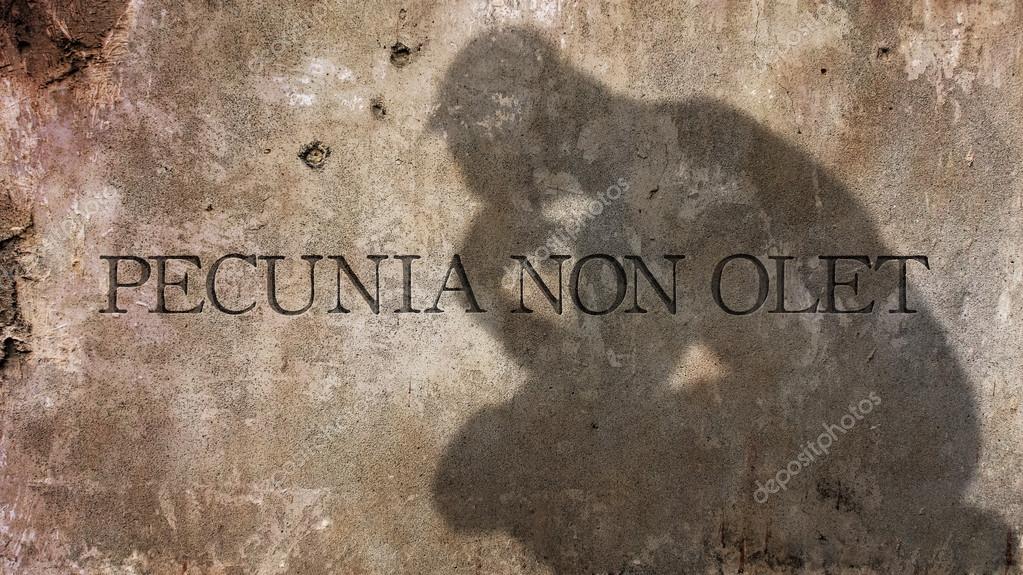
The following are photos of an old-fashioned Vespasiano, or public urinal, still in use in the tiny town Morcone, province of Benevento. Vespasian imposed a Urine Tax ( Latin: vectigal urinae) on the distribution of urine from public urinals in Romes Cloaca Maxima (great sewer) system. The phrase is ascribed to the Roman emperor Vespasian (ruled 69-79 CE ). Today the Latin phrase is used to mean that the value of money is not tainted by its origins and even though public urinals have become a rarity, to this day they are still known in Italy as Vespasiani (Vespasians). Pecunia non olet ('money does not stink') is a Latin saying. With the introduction of public urinals, the liquid waste could be collected and sold as a source of ammonia, which was used for tanning leather and by launderers to clean the patricians’ white woolen togas. Up until then, Romans had simply urinated into pots that were emptied into cesspools. (The first public toilets ever, by the way, were introduced by Vespasian in 74 A.D).


His famous aphorism “ Pecunia non olet” (Money does not smell) refers to the terse response he gave to his son Titus, who was complaining about the unpleasant nature of the Urine Tax his father had imposed on the product of the city’s urinals. PDM Creative Commons Public Domain Mark 1.Not a lot is known about the Emperor Vespasian’s life and brief rule, except that he was a highly competent general who built the gigantic Flavian Amphitheatre, better known as the Roman Colosseum. Roman emperors upon the collection of urine in public latrines, it means that the value of money is not tainted by its origins. An old Latin saying, Pecunia non olet, translates as 'Money has no odor'.
PECUNIA NON OLET ORIGIN FREE
This file has been identified as being free of known restrictions under copyright law, including all related and neighboring rights. Reviewed in the United States on August 4, 2010. Copyright may extend on works created by French who died for France in World War II ( more information), Russians who served in the Eastern Front of World War II (known as the Great Patriotic War in Russia) and posthumously rehabilitated victims of Soviet repressions ( more information). Pecunia non oletmoney does not stinkis a saying attributed to the Roman emperor Vaspasian when he reinstituted the tax on public toilets. Côte d'Ivoire has a general copyright term of 99 years and Honduras has 75 years, but they do implement the rule of the shorter term. This image may not be in the public domain in these countries, which moreover do not implement the rule of the shorter term.
PECUNIA NON OLET ORIGIN PRO
23), imperiestro Vespasianus reprimandesis da lua filiulo Titus pro impostir la publika urineyi. But you may be surprised to learn exactly how this phrase came about. The meaning behind the words is fairly simple: it doesn’t matter how you got your money, because it all has the same value. Segun la Romana historiisto Suetonius (Vesp. Pecunia non olet meaning money does not stink or money is not tainted is a famous phrase attributed to the Roman emperor Vespasian. Kelka-foye on uzas l’abreviuro non olet («ol ne odoras»). Pecunia (non) olet Latrine archaeology: the dirty side of wealth.

The Latin proverb ' Pecunia non olet' ( ' Money does not smell ' ) may have been created when he had introduced a urine tax on public toilets. Pecunia non olet esas Latina expresuro signifikanta «pekunio ne odoras». The phrase ' Pecunia non olet' is still used today to say that the value of money is not tainted by its origins. You must also include a United States public domain tag to indicate why this work is in the public domain in the United States. Note that a few countries have copyright terms longer than 70 years: Mexico has 100 years, Jamaica has 95 years, Colombia has 80 years, and Guatemala and Samoa have 75 years. The shield of the company is blazoned : ' Pecunia non olet Money does not smell '.

PECUNIA NON OLET ORIGIN PLUS
This work is in the public domain in its country of origin and other countries and areas where the copyright term is the author's life plus 70 years or fewer. That motto is still on the table, as the Italian government needs as much money as possible, even if it comes in small pieces of lottery tickets and receipts. Money does not stink, whatever the source is (referring, at that time, to taxes collected by using public washrooms). The work of art itself is in the public domain for the following reason: An Ancient Roman emperor once said pecunia non olet. This is a faithful photographic reproduction of a two-dimensional, public domain work of art.


 0 kommentar(er)
0 kommentar(er)
